Earlier this week, Jimmy Palmiotti announced that the noble experiment CREATOR OWNED HEROES would conclude after its 8th issue. Over the course of the magazine’s publication, outreach on social media emphasized the need to raise awareness and increase solicitation from comic shops to keep the multi-contributor series in motion. Consistently strong reviews appeared on media, fan, and blog sites with each issue, and as COH developed, it continued to raise the bar on high-quality content. The ascent has been dizzying, and exhilarating for readers and comics creators alike in an era of increasing awareness about the ups and downs of self-publication. It has been like watching crucial surgery in a live operating theatre in the hands of celebrated practitioners where the audience has come to play an integral role. The life of the patient has depended on their rapt attention in increasing numbers. Depending on your perspective, issue #8 will represent the final bow of an effort exploratory and unique, or perhaps somber flat-lining during a risky procedure that practitioners will attempt to learn from for some time to come. But either way, COH won’t be concluding in obscurity. Ironically, there will be more people in the operating theatre than ever before to witness its final moments and draw their own conclusions.
CREATOR OWNED HEROES #7 represents a particular crescendo in the magazine’s development, a point at which even those who have been following the series closely lean forward, aware that something unprecedented is unfolding before their eyes. It expresses a remarkable energy and a confluence of its methods and its goals due, in part, to the team of contributors it brings together. As Justin Gray says introducing his Brandon Seifert interview, “When we started Creator Owned Heroes, it wasn’t just a desire to self-publish; it was a multilevel dedication to comics that were being produced outside the work for hire landscape”. Gray also cites “ a fundamental desire to tell stories” as a common feature among the creators chosen as contributors. Issue #7 is a tour de force illustration of those criteria.
The powerhouse comic in the anthology is clearly Darwyn Cooke’s irreverent, rapidly paced and verbally exuberant “The Deadly Book”. Cooke hits high notes across the board of comic storytelling elements, from a lush, contrasty color palette in sky-blue, blood-red, and ink-black, to unexpected vantage points, compressed action, and even a very indie take on relating past events in short form via substantial narrative blocks. The comic displays the best possible outcomes for a skilled creator taken off the leash to tell the kind of story that they want to tell in the way that they see fit to tell it.
Jimmy Palmiotti, Justin Gray, Jerry Lando, and Paul Mountis follow Cooke with “Killswitch” in its 3rd installment of 4. They put the action back in indie in a big way and display a particular virtuosity in reversing a typical paradigm in espionage/hitman themed comics. Rather than telling the story with several panels, if not pages, of heavy exposition followed by the action sequences readers have been waiting for, they manage to reveal a wealth of exposition during an installment that, arguably, is one big action arc. They keep it interesting by demanding the reader put the pieces of information together for themselves, from Kill Switch’s complicated pseudo family life to the developing role of a nemesis. Rather than just telling a story well, which is a quite an achievement in itself, they manage to tell a story differently, once again illustrating the surprising results when creators have sufficient room for experimentation.
Steve Niles and Scott Morse bring an even greater variation in style and content to COH #7, pushing the boundaries of typical narrative structures while giving a nod to still-rich veins of comics tradition. They break down confined panel layout, and do away with textboxes and speech balloons to tell a noirish private-eye tale with disturbing gusto. “Meatbag’s” full page-feel conjures up Eisner’s SPIRIT while the first-person narrator places the storytelling firmly in Raymond Chandler territory. Add to these elements the use of limited color palette, heavy brush-stroke illustration and moody lettering, and you’ve got a finely balanced combination of old and new, making this a 21st century comic with a lot of room for innovation.
Then we have zombies. The subject-matter is in danger of being done into the ground in the TV, film, and comics medium, but in keeping with the challenges set by COH #7, Dean Haspiel and Jeffrey Burandt deliver something readers have simply never seen before, imploding any expectation of the familiar. Haspiel’s zombie artwork avoids the basic emphasis on blood and gore flooding zombie media these days and emphasizes, in a visceral way, the disjointedness of decomposition through trailing limbs and chunks of missing anatomy. This makes Haspiel and Burandt’s heroine seem all that much more solid, active, and vital as she spikes a zombie noggin and blasts through zombie brains. This is zombie-storytelling streamlined to basic psychological elements: loneliness, companionship, and, finally, the pulse-poundingly unexpected that makes the genre so popular. “Blood and Brains” retools zombie narrative by removing excess accretion and celebrating its potential in creator-owned style.
Photo-comic COMPLEX: “Luv_Underscore’s_U” by Seth Kushner, Chris Miskiewicz, and Dean Haspiel reminds us that the comics medium is expansive, varied, and should never feel too comfortable. Katelan Foisy and Miskiewicz star in this futuristic psychological landscape where the solid realities of the photo images help readers keep a grip on the otherwise shifting definitions of reality in the narrative. There’s a subtle ambiguity in the nature and future of technology, it’s use and misuse to contribute to human experience, and on the whole the photo-comic not only tells the reader but shows the reader the spell-like suspension of disbelief comics, in the right hands, are still capable of creating.
The prose content of COH #7 also contributes greatly to the purpose of the series, present from issue #1, of taking readers inside the world of creator-owned projects, an on the ground approach that not only educates but instructs. Justin Gray’s interview with Brandon Seifert allows the reader to hear straight from the horse’s mouth, “Want to be a writer? Start writing. It’s that simple, and that hard”. A “social media press conference” included in the issue also brings together advice and insight from creators and Steve Bunche concludes a full-on bootcamp for aspiring comics writers with plenty of solid advice that may seem counter-intuitive like “avoid topical subjects”. It’s clear that the meta-text of COH #7 is not there simply to sell books but to actually aid aspiring creators in avoiding the pitfalls that contributors have faced.
From issue #1, COH has given a strong impression of community among indie creators, and #7 continues to follow through in inclusiveness. A major profile of legendary tide-fighter Evan Dorkin, written by Christopher Irving, and photographed by Seth Kushner, only further illustrates the point. Creator-owned projects may seem like a new thing, maybe even a fad, but they aren’t. They’ve been breaking new ground for some time, and there’s plenty to be learned from observing the struggles of greats like Dorkin. Dorkin’s legacy in brief could be summed up in his statement: “I’ve come to hate when people say ‘Don’t get into comics’. I learned to say ‘Fuck that. If you want to get into comics, get into comics’”. But Dorkin, like many other creators, is also prepared to try to inform readers about what exactly they are getting into because a few tips a long the way can make all the difference.
The combined tone and attitude of the comics and prose in CREATOR OWNED HEROES #7 avoids even the faintest whiff of defeatism. The series’ message is still going strong, and the works it presents don’t even aspire to meet the professionalism of company-owned comics, they aspire to go beyond company-owned projects in terms of high-quality story-telling, artwork and design. After all, what’s the point in trying to keep up with the Joneses when you really want to set a new standard all your own? As an experiment, the COH series is winding down, but the data is being collected, the procedure is nearly complete, and no one doubts the skill of the team involved. The increasing momentum generated in the pages of COH #7 has, certainly, guaranteed that no one will stop reading until the experiment is complete.
Hannah Means-Shannon writes and blogs about comics for TRIP CITY and Sequart.org and is currently working on books about Neil Gaiman and Alan Moore for Sequart. She is @hannahmenzies on Twitter and hannahmenziesblog on WordPress.


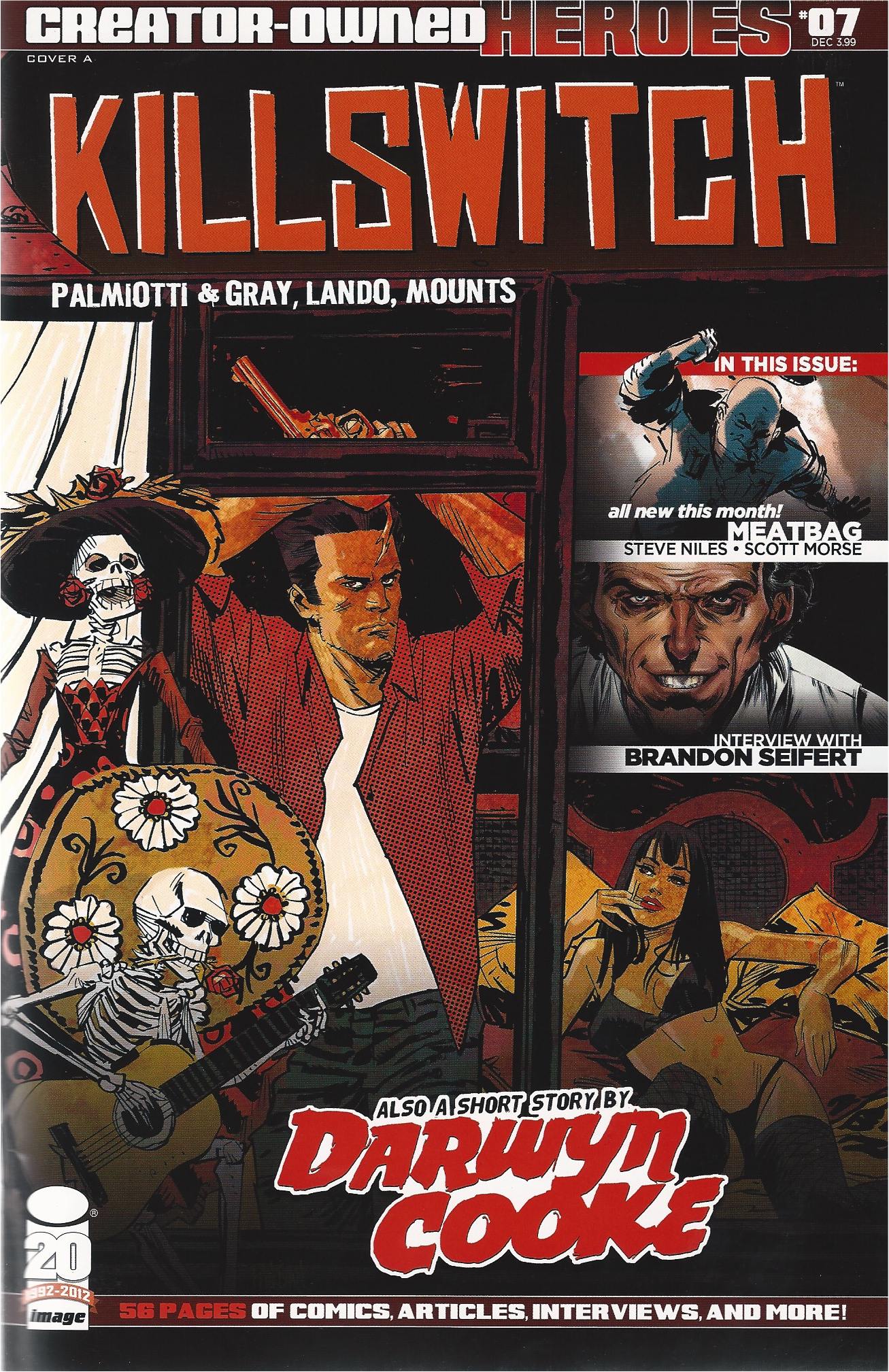
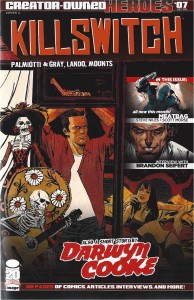
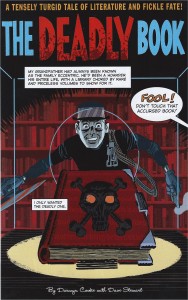
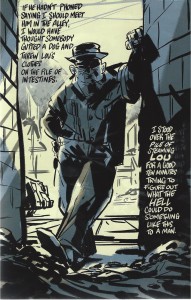
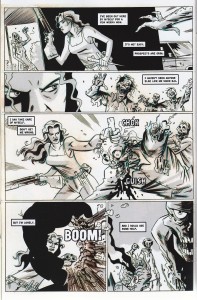
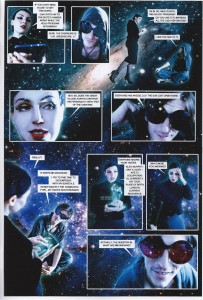
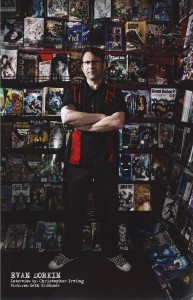
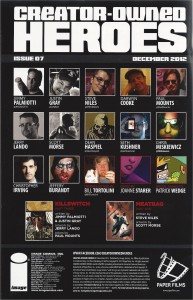
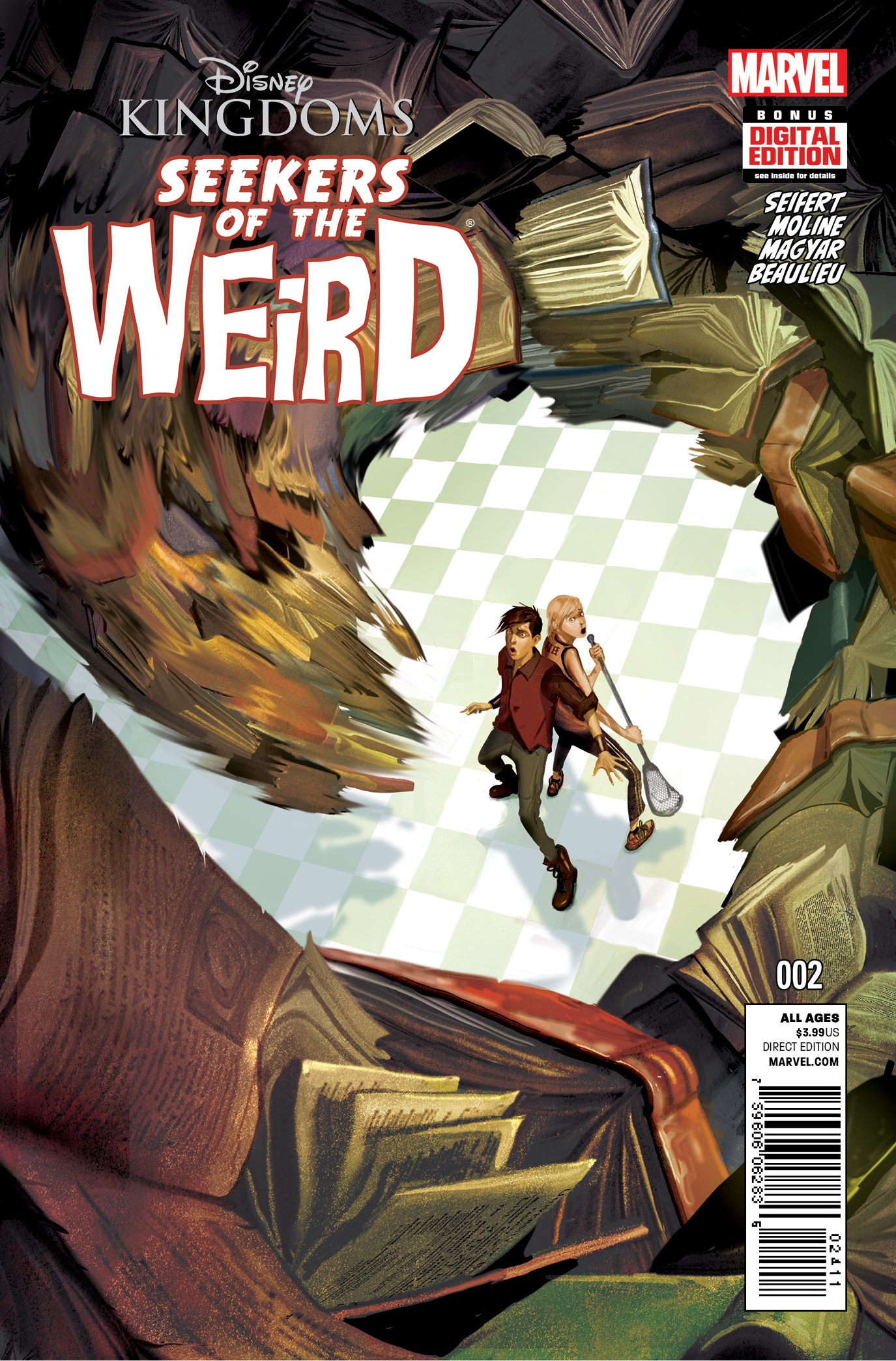
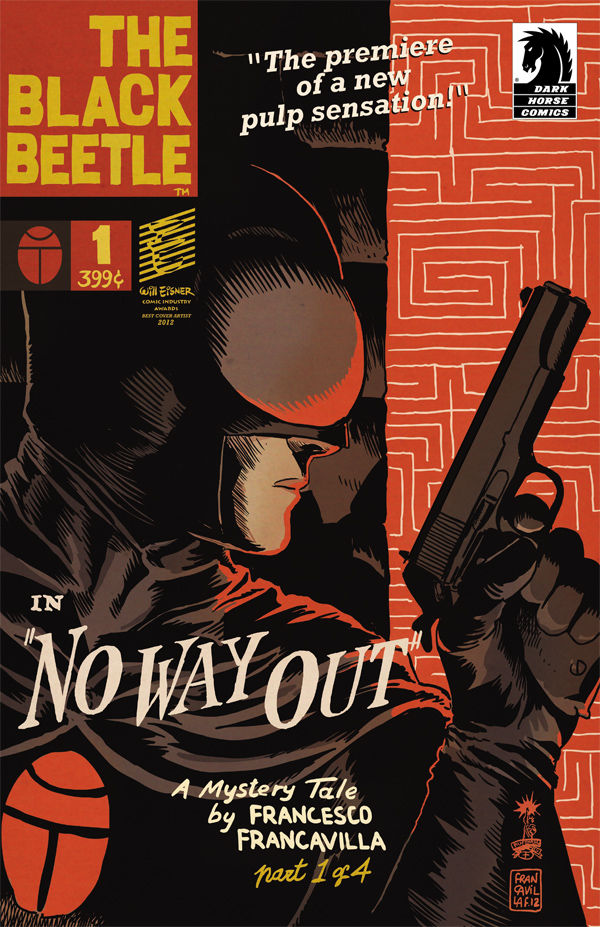


Sorry to see this going, and it was such a great way to sample new stuff and experience comics in different format; as truer serials. Thanks Jimmy!
I have to say I am very saddened to hear of the COH’s end. I have loved this book and been very vocally supportive of it from the beginning. I added it my pull list after issue 1, and have tried writing reviews, telling friends and just generally shouting it from the rooftops. This series is a truly unique work of art, with interviews, awesome comics, and creator spotlights. I am sure we’ll more awesomeness to come from the creators involved but it saddens me that this venue for creativity will no longer be available to artists.
There is another anthology out there every month that’s an 80-page giant, most issues packed to the gills with creator-owned content. It’s called “Dark Horse Presents” and it is awesome. Who knows, maybe some of the COH crew could use that as an outlet for these kinds of endeavors? Steve Niles has certainly been no stranger to its pages.
Thanks for the kind words. We currently have a series called DEEP SEA running in DHP.
Jimmy: right on! And I would have known that if I wasn’t a couple months behind in reading my copies…looks like the last one I read is #15, literally the issue before “Deep Sea” started. I guess I have something new to look forward to!
The problem, as I see it, is across the board. Not only in the comics medium but everything we consider entertainment. Over the last 10 o 15 years there has been a creeping malaise which has eroded originality and the willingness to experiment with things outside of most people’s comfort zones. Even when you have a concerted effort by well-known names to push the envelope of the medium, less and less people are willing to at least take a chance on the finished product.
I think COH was a bold experiment that harkened back to the past, whilst coming at it from a 21st century perspective. Solid, good-looking stories presented in an attractive package that couldn’t have been cheap to produce. I applaud the efforts o Jimmy et al and saddened to see that it won’t be making it past an #8. Maybe in some other format it might be more successful?
I love DHP and was delighted when it came back.
I particularly love the opportunities it’s given to indie friends to get their work out there.
COH still had a different vibe though and an even more accessible feel for fans and creators not to mention greater diversity of content and style.
For several months now, I’ve been seeing Steve Niles promote COH on his twitter, but I had continued to put off checking out the book as I’ve a long list of books to buy and read. In general, I tend to wait for most books to reach trade paperback. That’s all started to change with the arrival of true digital comic options. Still, I’ve found myself still waiting for most digital books to drop in price down to $1.99 or, even better, go on sale of $.99.
Reading the announcement about the ending of COH has forced me to reevaluate my reading and purchasing habits. I finally jumped on the book and caught up with the whole run from 1-7. Only now, I’m realizing how great the book is and how unusual of a product it is in the overall comics scene. Had I jumped earlier and shared my enthusiasm with others, maybe we’d get more than just 8 issues of this amazing magazine.
For my part, I want to put my money where my mouth is and start helping to support the kind of exciting projects, like COH, that help to push the boundaries of comics narrative and storytelling. It might be too late for COH in its current iteration, but it’s a reminder that we need to show our support and enthusiasm for unique and interesting projects rather than continuing to support the same old fare that make up the majority of books in the industry.
Ricardo Rodriguez liked this on Facebook.
Comments are closed.